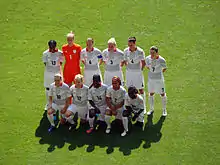Football in the United Kingdom
Association football is organised on a separate basis in each of the four constituent countries that make up the United Kingdom (UK), with each having a national football association responsible for the overall management of football within their respective country. There is no United Kingdom national football team. Football has been the most popular sport in the UK since the 1860s. Rugby union, rugby league and cricket are other popular sports.
This article provides some comparisons concerning football in the home nations. For details about football across the United Kingdom and its territories, refer to the table below:
Football associations
Each of the countries of the United Kingdom, sometimes referred to as the home nations, has a national football association responsible for the overall management of football within their respective nation: The Football Association, (FA) is responsible for England and the Crown Dependencies and was founded in 1863, The Scottish Football Association (SFA) was founded in 1873 followed by the Football Association of Wales (FAW) in 1876 and Irish Football Association (IFA) in 1880. They are the world's four oldest national football associations and play an important part in football worldwide as they take up four of the eight seats on the International Football Association Board (IFAB), which determines the Laws of the Game, the other four seats being occupied by FIFA.
Men's International football
.jpg.webp)
The United Kingdom plays its international football as separate Home Nations teams of England, Scotland, Wales and Northern Ireland. The only exception to this is during the Summer Olympics where the United Kingdom is represented by Great Britain Olympic football team, which despite the name includes Northern Ireland. Some people, such as politician Tony Banks, have argued for the UK having just one team to represent it for all competitions but all four football associations are very much against such an idea.
There are sometimes issues about which team players are eligible for (as all the players representing those teams have British passports), but a player is generally eligible for whichever nation he, his parents or grandparents were born in (in the case of these being different nations, then he can choose). This has been the case with some players such as Aiden McGeady and Jack Collison who have chosen to play for the country of their parental heritage rather than the country of their birth. Players from crown dependencies (i.e. the Isle of Man and the Channel Islands), which are technically not in the UK, are eligible for all four teams (e.g. Matt Le Tissier and Graeme Le Saux, both of whom opted for England), as are British citizens born outside the UK or its possessions (e.g. former England international Owen Hargreaves, born in Canada).
United Kingdom Olympic history

In the early years, the Olympic football competition was contested between amateur sides, and the British Olympic Committee agreed to let the England amateur team represent the entire UK. More recently the Olympic competition has been played by under-23s teams and Great Britain has not normally been represented. This is because qualification is based on the UEFA Under-21 championship, which means it is impossible for Great Britain to qualify as the national teams participate separately in that competition. There have been instances where an individual nation would have qualified, but a lower ranked nation has taken its place instead.
An exception to this was the 2012 Summer Olympics, which were hosted to London. This meant that Great Britain qualified, by right of being host nation, for the football tournaments. While the English Football Association favoured the idea of a unified team for 2012, the other three federations opposed the concept. The Scottish Football Association was particularly strident in this view, fearing that a single UK team would jeopardise the independent status all four Home Nations enjoy. FIFA set a deadline of 1 June 2009 for the Home Nations to come to an agreement, which resulted in the four associations sending a letter to FIFA stating that while the Scottish, Welsh, and Northern Ireland associations still opposed the concept of a unified Great Britain team and would not participate in such a team, they would not prevent England from fielding a team under that banner.[1] FIFA president Sepp Blatter officially approved the deal within days.[2] However, even though the Welsh had said they would not participate in such a team, Welsh players such as Gareth Bale expressed an interest in playing for a unified team.[3] The Football Association chose to disregard the agreement and selected five Welsh players for the men's team.[4] The future of Great Britain Olympic teams is uncertain as there is no mechanism for them to qualify for forthcoming tournaments. However, the presence of a unified women's team at Tokyo 2020[5] gave hope for the future of the men's team.
International matches between the home nations
The UK teams have played each other more times than any other footballing nations in the world. The world's first international football match was played between Scotland and England in Glasgow in 1872 (a 0–0 draw). From then on, all four teams started playing regular friendlies against each other. In 1883 a formal competition between the UK's teams, the British Home Championship, was introduced, guaranteeing that each team would play the other three at least once a season. The Championship was discontinued in 1984, partly due to problems of crowd trouble, and partly due to the desire of England (and to a lesser extent Scotland) to contest international fixtures against larger and more powerful nations.
While the British Home Championship was being played, the UK teams were also drawn together on a number of occasions during qualification competitions for the FIFA World Cup and UEFA European Championships. Early tournaments simply used the British Championship as a qualifying group, but during qualification for the 1974 World Cup, England and Wales were drawn in the same group. Subsequent to this, three more qualification tournaments saw UK teams drawn together while the British Championship was being played. Since the end of the British Home Championship, the teams have played each other mainly when drawn together in international competitions such as the European Championship or the World Cup, with occasional friendly fixtures.
In 2011, Vauxhall signed sponsorship deals with the FA, SFA, FAW and IFA, and stated their desire to see the four home nations play each other in a version of the British Home Championship again.[6]
Since the end of the British Home Championship, there have been many calls for it to be restored to the schedule. One argument is that it would replace so-called "meaningless friendlies" with a proper tournament that would raise the interest of both the players and fans. However, there has been a lack of enthusiasm for such a proposal, particularly from England; as time has passed, The Football Association has grown in commercial power beyond that of the other three home associations, so that it could be claimed that friendlies against major footballing nations from Europe and South America are worth more than playing the home nations.
In December 2006, Lawrie Sanchez suggested that a tournament featuring the three home Celtic nations plus the Republic of Ireland could be organised.[7] He stated that the IFA hierarchy were supportive of a new Home Championship, while the SFA expressed guarded interest. This was further elaborated in February 2007 when Alex McLeish, the newly appointed manager of Scotland, expressed interest in playing against the home nations and the Republic of Ireland. Accepting that England would probably not be interested in a new Home Championship, he said, "If the English FA are thinking about opposition for the new Wembley, I hope we're in their thoughts." Both England and Wales were less enthusiastic, stating that with the number of friendlies played each year it would "be difficult to see how the Home Nations would fit in".[8]
On 18 September 2008, it was announced that a tournament featuring the Republic of Ireland, Scotland, Wales and Northern Ireland – the Nations Cup – would be played in 2011.[9] The attendances for the matches, particularly those not involving the Republic or Scotland, were low and the tournament has not been repeated.
FIFA (October 2020)[10]
| Team | Points | Rank |
|---|---|---|
| 1669 | 4/210 | |
| 1550 | 20/210 | |
| 1458 | 41/210 | |
| 1446 | 45/210 | |
| 983 | 168/210 | |
| 921 | 184/210 | |
| 897 | 193/210 | |
| 890 | 195/210 | |
| 862 | 203/210 | |
| 842 | 208/210 | |
| 821 | 209/210 |
UEFA (2017)
| Team | Coeff | Rank |
|---|---|---|
| 36,231 | 6/55 | |
| 29,269 | 14/55 | |
| 27,127 | 21/55 | |
| 25,662 | 27/55 | |
| 7,550 | 55/55 |
CONCACAF (2018)[11]
| Team | Points | Rank |
|---|---|---|
| 924 | 21/40 | |
| 543 | 33/40 | |
| 483 | 34/40 | |
| 435 | 35/40 | |
| 261 | 39/40 | |
| 261 | 40/40 |
National football teams of the Crown dependencies and overseas territories
Although technically not part of the UK, football in the crown dependencies is governed by The Football Association and represented by the England national football team. At the same time the crown dependencies also have their own non-FIFA affiliated teams:
Overseas territories are not technically part of the UK either, and they have their own teams. Some of the overseas territories have full or associate membership in the corresponding regional federations:
- Ascension Island national football team
- Anguilla national football team
- Bermuda national football team
- British Virgin Islands national football team
- Cayman Islands national football team
- Falkland Islands national football team
- Gibraltar national football team
- Montserrat national football team
- Pitcairn Islands national football team
- Saint Helena national football team
- Turks and Caicos Islands national football team
Women's International football
Similar to in men's football, international women's football is played in separate Home Nations teams of England, Scotland, Wales and Northern Ireland. Again, the only exception to this is during the Summer Olympics where the United Kingdom is represented by Great Britain women's Olympic football team, which again includes Northern Ireland.
United Kingdom Olympic history
Women's football began in the Summer Olympics at Atlanta 1996. Unlike men's football, women's football at the Olympics is played at full senior level. The Great Britain Women have historically not competed at football in the Summer Olympics for the same reason as the men's team.
Again, an exception to this was the 2012 Summer Olympics, which Great Britain were hosts. This meant that Great Britain qualified, by right of being host nation, for the football tournaments. The team was approved to play in the tournament via the same process as the men's with England being granted permission to play under the name "Great Britain". Despite this, two Scottish players for the women's team, which saw Great Britain reach the quarter finals. The success at London 2012 gave hope for a unified team to complete at Rio 2016 but no agreement between the four football associations could be reached.[12] However it was agreed that a women's team could compete in the Tokyo 2020 edition of the Olympics.[5]
FIFA (August 2020)[13]
| Team | Points | Rank |
|---|---|---|
| 1999 | 6/159 | |
| 1804 | 21/159 | |
| 1658 | 34/159 | |
| 1432 | 55/159 | |
| 987 | 136/159 |
UEFA (2017)
| Team | Coeff | Rank |
|---|---|---|
| 39,880 | 3/49 | |
| 33,632 | 11/49 | |
| 25,807 | 18/49 | |
| 17,051 | 30/49 |
Men's club football
League systems
.jpg.webp)
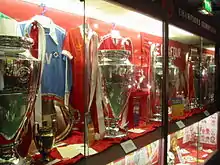
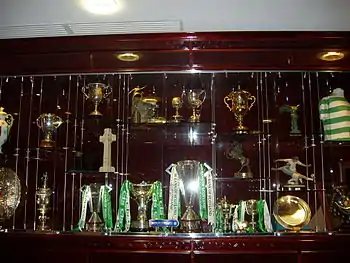
There are separate club football league systems for England, Scotland, Wales and Northern Ireland though some clubs play outside their country's respective system for mainly logistical reasons. Wales did not get a national league until 1992 (though regional leagues existed prior to that), which explains why the top four Welsh clubs play in what is now regarded as the English system.
The English football league system includes hundreds of interlinked leagues, consisting of thousands of divisions. The Premier League is at the top, followed by the English Football League and then the Football Conference, where the structure starts to become regional and includes the Northern Premier League, the Southern League, the Isthmian League and many more besides. The Welsh clubs of Cardiff City, Merthyr Tydfil, Newport County, Swansea City and Wrexham play in the English system. Chester City, who played in The Football League until they dissolved in 2010, had a stadium that straddles the Welsh border, with the Club offices in England but the pitch actually in Wales.
The Northern Ireland football league system includes the IFA Premiership. One Northern Irish club, Derry City, plays its football outside of the UK in the Republic of Ireland football league system.
The Scottish football league system similarly operates on a pyramid basis. 42 clubs compete in the Scottish Professional Football League, which is split into four divisions. Below that there are regional leagues, the Highland Football League, and the Lowland Football League above the East of Scotland Football League, South of Scotland Football League and the West of Scotland Football League. Two English clubs, Berwick Rangers and Tweedmouth Rangers, play in the Scottish system. Outside of the pyramid is one senior league, the North Caledonian Football League, Junior football and amateur football.
The Welsh football league system includes Cymru Premier (historically the Welsh Premier League) and a number of regional leagues. Premiership club The New Saints began playing their home matches on the English side of the border in Oswestry in 2007. Historically, the Saints represented the small Welsh village of Llansantffraid-ym-Mechain, but merged with Oswestry Town, which had historically played in the Welsh football system, in 2003.
Cup competitions
There is a multitude of knockout club cup competitions. Again, these are organised on an English, Scottish, Welsh or Northern Irish basis. Many carry qualification for the UEFA Europa League for the winners.
Each football association runs its own national cup, the FA Cup in England, the Scottish Cup in Scotland, the Welsh Cup in Wales and the Irish Cup in Northern Ireland. Traditionally, these cups have been the most liberal about whom they accept, with many teams from outside that nation (and/or league system) entering. More recently, rules have been tightened, with the competitions only open to teams who play in that nation's football league system.
There are also a number of other cups that have more stringent requirements but carry less prestige, including the Football League Cup in England, the Scottish League Cup in Scotland, Welsh Premier League Cup in Wales and Irish League Cup in Northern Ireland. Some past cups have even crossed UK boundaries, such as the Anglo-Scottish Cup. Another cup competition that crosses the UK's border is the current Champions Cup, which features the champions of the Northern Ireland league and the Republic's.
Clubs playing in other countries
The nature of the governance of the game in the United Kingdom, with four separate associations, has led to the anomaly of clubs based in one of the four nations playing in competitions run by another. At present, this encompasses the following clubs playing senior football:
 England →
England → 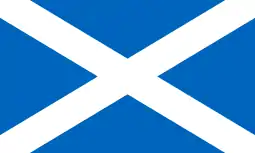 Scotland - Berwick Rangers, Tweedmouth Rangers
Scotland - Berwick Rangers, Tweedmouth Rangers England →
England → .svg.png.webp) Wales - The New Saints
Wales - The New Saints.svg.png.webp) Wales →
Wales →  England - Cardiff City, Merthyr Town, Newport County, Swansea City, Wrexham
England - Cardiff City, Merthyr Town, Newport County, Swansea City, Wrexham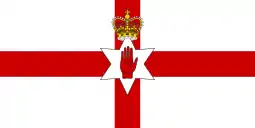 Northern Ireland →
Northern Ireland →  Ireland - Derry City
Ireland - Derry City
Berwick Rangers, The New Saints and Derry City are members of the association that runs the competitions in which they participate. As a consequence, Berwick is classed as a Scottish club, TNS as Welsh and Derry as Irish. This distinction is important especially where European competition is concerned, and both TNS and Derry City have represented Wales and Ireland several times in Europe. However, the Welsh clubs playing in England were more difficult to define, as, although they played almost exclusively in English competitions (with the exception of the Welsh Cup), they were members of the Football Association of Wales, leading to the question of their status. In 2008, Cardiff City reached the final of the FA Cup, which meant they would have been eligible for one of England's places in Europe had they won. The question was only resolved in 2011, when it was decided that Welsh clubs playing in the Premier League and Football League would be subject to governance by The Football Association rather than the FAW. Clubs playing in English competitions below the Football League remain under the purview of the FAW.[14] As of the 2020–21 season, Cardiff City, Swansea City and Newport County play in the Football League, while Wrexham remain outside in the National League.
UEFA (2020)
| Team | Coeff | Rank |
|---|---|---|
| 55.500 | 3/55 | |
| 27.875 | 14/55 | |
| 5.000 | 47/55 | |
| 4.875 | 48/55 | |
| 4.750 | 49/55 |
Club meetings in Europe
There have been several occasions when clubs from the four home nations have played each other in European competition.
European Cup/UEFA Champions League
British teams have won the European Cup 13 times in total, joint with Italy and behind Spain. The UK is also the sovereign state with the most clubs to have won it; (Liverpool (6), Manchester United (3), Nottingham Forest (2), Aston Villa (1), and Chelsea (1), from England, plus Celtic (1) from Scotland). British clubs have also been runners-up on eight occasions (Liverpool (2), Celtic (1), Manchester United (2), Leeds United (1), Arsenal (1) and Chelsea (1))
Celtic became the first British club to win the Cup in 1967, beating Italian side Inter who had won 2 of the previous 3 finals 2–1 in Lisbon. The first English team to win the competition was Manchester United, who defeated two-time winners Benfica of Portugal 4–1 at Wembley a year later, in 1968. English teams enjoyed the most successful period when they won the European Cup six years in a row from 1977 to 1982.
As a result of the Heysel Stadium disaster of 1985, English clubs (though not those of other British associations) were banned from European competition. The ban was lifted in 1990 for all teams except Liverpool (which had taken part in the Heysel event). Liverpool returned to European competition the following year.
England is home to the Premier League which has become one of the best leagues in the world, attracting viewers from various countries around the globe. The Champions League final in 2010 was the first final in six years that did not feature an English team. In 2007, 2008 and 2009, three out of the four teams in the semi-finals were English. In May 2008 Manchester United and Chelsea played in the first ever all-English final, which Manchester United won on penalties.
Inter-Cities Fairs Cup/UEFA Cup/UEFA Europa League
British clubs have also been successful in the Inter-Cities Fairs Cup and the UEFA Cup/Europa League, with a total of 10 wins in the two competitions (all English), together with 12 runners-up placings (including three Scottish).
European Cup Winners Cup
The now defunct European Cup Winners Cup has been won 10 times by British clubs (2 Scottish), with British clubs being runners-up seven times (2 Scottish).
Women's club football
League systems
Women's club football is also played in separate league systems for England, Scotland, Wales and Northern Ireland.
The English women's football league system also includes many interlinked leagues, consisting of thousands of divisions. The FA Women's Super League is at the top, with the FA Women's Championship second, and then the FA Women's National League encompassing the third and fourth tier. Below this are various regional leagues which feed into the upper tiers.
The Northern Irish women's football league system is headed by the IFA Women's Premiership.
The Scottish women's football league system similarly operates on a pyramid basis with the SWPL 1 and SWPL 2 heading the pyramid.
The Welsh women's football league system includes the Welsh Premier Women's Football League which was founded in 2009, in addition to various regional leagues.
Cup competitions
Similar to in men's football, each FA runs their own women's cup with the Women's FA Cup, Scottish Women's Cup, FAW Women's Cup, and IFA Women's Challenge Cup existing as national cups in the respective countries. The FA Women's League Cup also exists in England, and the Scottish Women's Premier League Cup, Scottish Women's Football League First Division Cup, Scottish Women's Football League Second Division Cup existing on Scotland.
UEFA (2020)
| Team | Coeff | Rank |
|---|---|---|
| 88.176 | 2/50 | |
| 22.000 | 15/50 | |
| 3.500 | 40/50 | |
| 2.000 | 43/50 |
Stadiums
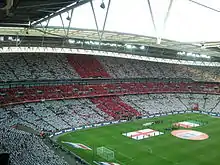
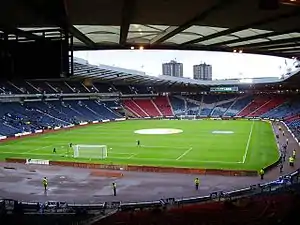
.jpg.webp)

Each of the home nations has a "national stadium" in which they play the majority of their home games:
 England – Wembley Stadium, London (90,000)
England – Wembley Stadium, London (90,000) Scotland – Hampden Park, Glasgow (51,866)
Scotland – Hampden Park, Glasgow (51,866).svg.png.webp) Wales – Cardiff City Stadium, Cardiff (33,280)[lower-alpha 2]
Wales – Cardiff City Stadium, Cardiff (33,280)[lower-alpha 2] Northern Ireland – Windsor Park, Belfast (15,000)
Northern Ireland – Windsor Park, Belfast (15,000)
The Millennium Stadium, which has also been used for Wales home matches, is used primarily by the Welsh national rugby union team for its home internationals, while Windsor Park is a club ground owned by Linfield that the IFA leases for use by the Northern Ireland national team. In the event that the stadium is unavailable, the national team will usually play at a club ground.
These are the top twelve football stadiums in the UK by capacity (all with capacity above 50,000).
| Stadium | City | Capacity |
|---|---|---|
| Wembley Stadium | 90,000 | |
| Old Trafford | 75,731 | |
| Millennium Stadium[lower-alpha 3] | 74,500 | |
| Tottenham Hotspur Stadium | 62,062 | |
| Celtic Park | 60,411 | |
| Emirates Stadium | 60,260 | |
| London Stadium | 60,000 | |
| City of Manchester Stadium | 55,097 | |
| Anfield | 54,074 | |
| St James' Park | 52,404 | |
| Hampden Park | 51,866 | |
| Ibrox Stadium | 50,817 |
Tournaments hosted
National football centres
Currently, none of the British nations except for England operates a national academy. St George's Park National Football Centre, Burton upon Trent was officially opened on 9 October 2012.[15]
National football museums
- England: The National Football Museum Based at Urbis in Manchester. Holds collections of International, European and National significance. Charts the history of football and the game in England.
- Scotland: The Scottish Football Museum Housed at Hampden Park in Glasgow. Holds collections of International and National significance. Charts the history of Scottish Football.
See also
Notes
- Only territories with articles are shown.
- Whilst the Cardiff City Stadium is the most commonly used venue for Wales home games, the Millennium Stadium, Liberty Stadium, and Racecourse Ground are also commonly used.
- The Millennium Stadium is primarily used for rugby union.
- Part of a pan-European tournament.
References
- "England to go solo with 2012 Olympic team?". ESPNsoccernet. 29 May 2009. Retrieved 29 May 2009.
- "Fifa gives green light for English teams to represent Britain at London 2012". The Guardian. 31 May 2009. Retrieved 11 July 2009.
- "Olympics: Gareth Bale on football at London 2012". The Guardian. 15 February 2011.
- "London 2012: Five Welshmen in GB Olympic football team". BBC. 2 July 2012.
- https://www.bbc.co.uk/sport/amp/football/48791484
- Slater, Matt (10 January 2011). "Vauxhall tie-ins herald return for British Championship". BBC News. Retrieved 7 April 2011.
- "Sanchez wants Celtic tournament". BBC News. 12 December 2006. Retrieved 2 May 2010.
- BBC Sport: "Home nations consider new league, 4 Feb 2007 accessed 18 September 2008
- "Celtic nations to play 2011 event BBC Sport. Retrieved 18 September 2008
- https://www.fifa.com/fifa-world-ranking/ranking-table/men/
- http://jpmontoya.com/concacaf/ranking.html
- https://www.bbc.co.uk/sport/football/32125977
- https://www.fifa.com/fifa-world-ranking/ranking-table/women/
- Scott, Matt (6 May 2011). "Football Association breaks Welsh jurisdiction over Cardiff and Swansea". The Guardian. Retrieved 20 January 2012.
- "St George's Park centre of excellence officially opened". BBC Sport. BBC. Retrieved 10 October 2012.
External links
| Wikimedia Commons has media related to Association football in the United Kingdom. |
.jpg.webp)
